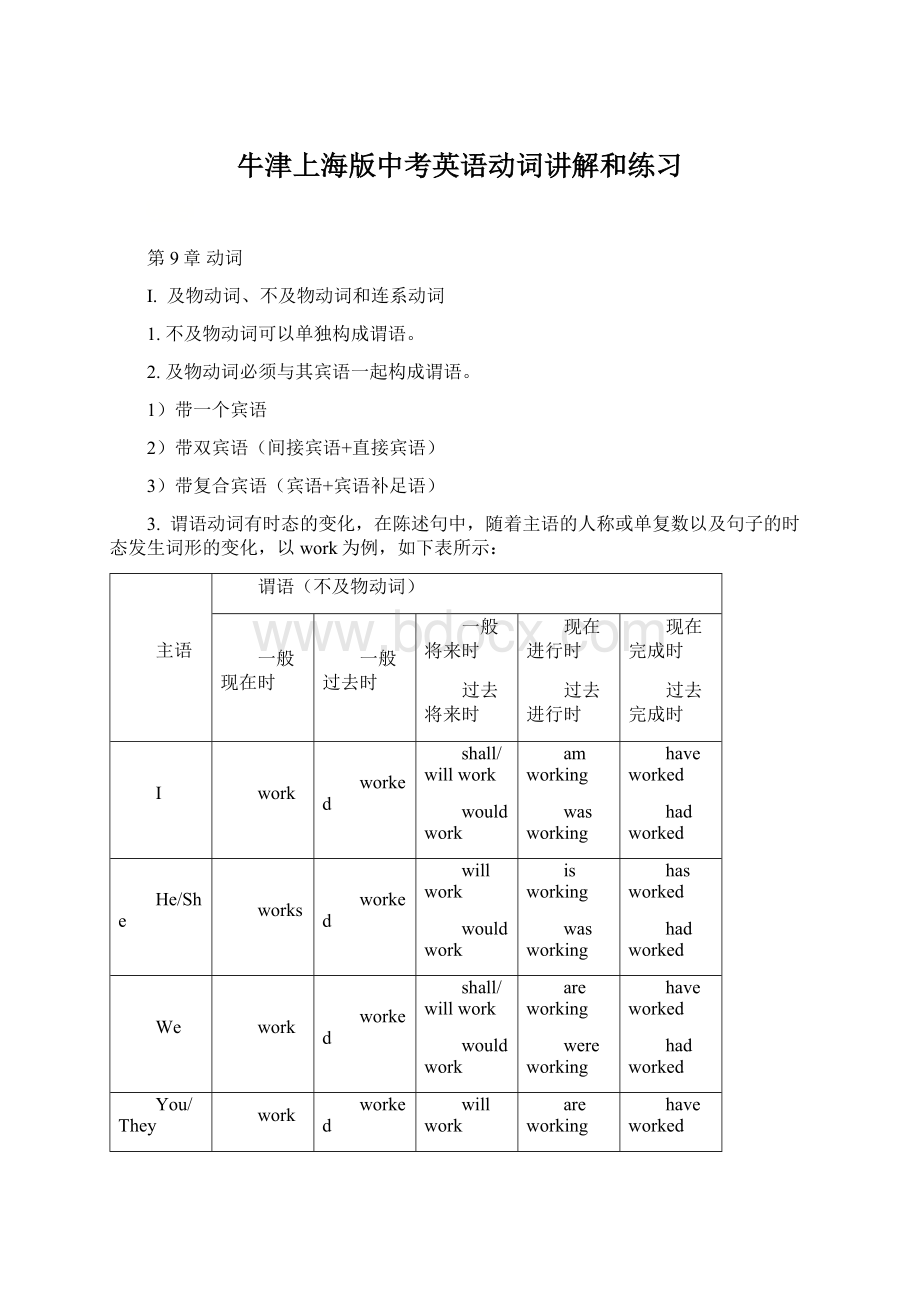牛津上海版中考英语动词讲解和练习.docx
《牛津上海版中考英语动词讲解和练习.docx》由会员分享,可在线阅读,更多相关《牛津上海版中考英语动词讲解和练习.docx(38页珍藏版)》请在冰豆网上搜索。

牛津上海版中考英语动词讲解和练习
第9章动词
Ⅰ.及物动词、不及物动词和连系动词
1.不及物动词可以单独构成谓语。
2.及物动词必须与其宾语一起构成谓语。
1)带一个宾语
2)带双宾语(间接宾语+直接宾语)
3)带复合宾语(宾语+宾语补足语)
3.谓语动词有时态的变化,在陈述句中,随着主语的人称或单复数以及句子的时态发生词形的变化,以work为例,如下表所示:
主语
谓语(不及物动词)
一般现在时
一般过去时
一般将来时
过去将来时
现在进行时
过去进行时
现在完成时
过去完成时
I
work
worked
shall/willwork
wouldwork
amworking
wasworking
haveworked
hadworked
He/She
works
worked
willwork
wouldwork
isworking
wasworking
hasworked
hadworked
We
work
worked
shall/willwork
wouldwork
areworking
wereworking
haveworked
hadworked
You/They
work
worked
willwork
wouldwork
areworking
wereworking
haveworked
hadworked
4.连系动词必须与其表语一起构成谓语。
连系动词be是主系表结构句子的主要系动词,它在陈述句中位于主语和表语之间,随着主语的人称或单复数以及句子的时态发生词形的变化,如下表所示:
主语
系动词
表语
一般现在时
一般过去时
一般将来时
过去将来时
现在完成时
过去完成时
I
am
was
shall/willbe
wouldbe
havebeen
hadbeen
happy.
HeSheIt
is
was
willbe
wouldbe
hasbeen
hadbeen
happy
We
are
were
shall/willbe
wouldbe
havebeen
hadbeen
happy
You/They
are
were
willbe
wouldbe
havebeen
hadbeen
happy
专项训练1
选择填空。
1.Lookup!
Thekite__________highinthesky.
A.fliesB.flewC.hasflownD.isflying
2.Weallknowthattheearth__________aroundthesun.
A.goB.goesC.wentD.isgoing
3.Jenny__________anovelfromseventosightlasteight.
A.readB.wasreadingC.isreadingD.wouldread
4.Ascarf__________youwarmasthetemperaturefalls.
A.keptB.haskeptC.willkeepD.wouldkeep
5.Finally,thebigseriousforestfire__________bythefiremenyesterday.
A.putsoutB.putoutC.wasputoutD.hasputout
6.Where__________you__________?
Ilookedforyoueverywhere.
A.has...beenB.did...goC.have...goneD.are...going
7.Shedidn’tgotoseethedolphinshowwithusbecauseshe__________italready.
A.seesB.sawC.hasseenD.hadseen
8.Theteachertoldthestudentsthatthey__________aschoolsportsmeetingthenestweek.
A.haveB.hadC.willhaveD.wouldhave
9.-__________theflightMU823__________?
-No,notyet.
A.Has...arrivedB.Does...arriveC.Will...haveD.Is...arriving
10.--Thisisano-right-turnarea.Don’tyouseethesigh?
--Oh,sorry.I__________it.
A.hadn’tseenB.won’tseeC.didn’tseeD.doesn’tsee
11.I__________tostayathomeandprepareformytestthisweekend.
A.haveB.willhaveC.hadD.has
12.-IknockedintoatreewhenIwenttotherailwaystationformyfriend.
-Isupposeyou__________toofast.(07中考江西南昌)
A.driveB.aredrivingC.droveD.weredriving
13.Oh,whataday!
It__________heavily.
A.isstillrainingB.wasstillrainingC.stillrainedD.stillrains
14."__________you__________upforKaiXinWang?
It'ssuchapopularonlinegame!
''Maryaskedmeexcitedly.
A.Do,signB.Have;signedC.Did;signD.Are;signed
15.It'stoolatenow.Thesupermarket__________.
A.closesB.isclosedC.isbeingclosedD.isclosed
16.Coffeeisready.Howniceit__________!
Wouldyoulikesome?
A.looksB.smellsC.soundsD.feels
17.Nowthestudentseach__________anEnglish-Chinesedictionary.(08中考南通)
A.hasB.haveC.ishavingD.arehaving
18.Thesinger__________welcomedifshe__________toourschool.
A.is;comesB.is;willcome
C.willbe;comesD.willbe;willcome
19.Keplerprovedthatthesun__________thecenterofthesolarsystem.
A.isB.wasC.hadbetterD.wouldbe
Ⅱ.助动词
1.助动词be(am,is,are;was,were),与动词的现在分词一起,帮助构成现在进行时和过去进行时。
2.助动词be(am,is,are;was,were;willbe;have/hasbeen;am/is/arebeing;was/werebeing),与动词的过去分词一起,帮助构成被动语态。
3.助动词do(does,did)帮助构成一般现在时和一般过去时的否定句和疑问句。
4.助动词have(has,had)与动词的过去分词一起,帮助构成现在完成时和过去完成时,还帮助构成否定句和疑问句。
5.助动词will/shall(would/should)与动词原形一起,帮助构成一般将来时和过去将来时,还帮助构成否定句和疑问句。
专项训练2
按要求改写句子,每空限填一词。
1.Themusicsoundswonderful.(改为否定句)
Themusic____________________wonderful.
2.Hisparentsmanageasmallhotel.(改为否定句)
Hisparents____________________asmallhotel
3.Mr.Blackhasastrongwill.(改为否定句)
Mr.Black____________________astrongwill.
4.Maryputtheflowersinthecentreofthetable.(改为否定句)
Mary____________________theflowersinthecentreofthetable.
5.Thevillagershavesetouttolookforthelostsheep.(改为否定句)
Thevillagers____________________setouttolookforthelostsheep.
6.Thegirlsaresinginganddancingattheparty.(改为选择疑问句)
__________thegirlssinging__________dancingattheparty?
7.Postmendeliverlettersandmagazineseveryday.(改为一般疑问句)
__________postmen__________lettersandmagazineseveryday?
8.I’veneverbeentoSouthChina.(改为一般疑问句)
__________you__________beentoChina?
9.TheShanghaiRadioandTVTowerstandsinPudongNewArea.(改为一般疑问句)
__________theShanghaiRadioandTVTower__________inPudongNewArea?
10.Someprofessorswilldiscussforeignlanguageteachingataninternationalconferencenextmonth.(改为一般疑问句)
__________someprofessors__________foreignlanguageteachingataninternationalconferencenextmonth?
【答案】1.doesn’tsound2.don’tmanage3.doesn’thave4.didn’tput5.haven’tset
6.Are,or7.Do,deliver8.Have,ever9.Does,stand10.Will,discuss
Ⅲ.动词的时态
i.一般现在时
1.表示普遍真理或客观事实。
2.表示现在的习惯动作或状态。
3.表示将来时间(用于某些条件状语从句和时间状语从句中)。
4.一般现在时的动词形式通常与动词原形相同,但在主语为第三人称单数时,词尾加-s或-es,其规则如下:
1)一般动词都在词尾加-s,如:
digs,sings,looks,lives,cleans等;
2)当动词以s,sh,ch,x,o结尾时,加-es,如:
presses,washes,watches,fixes,goes等;
3)当动词以辅音字母+y结尾时,先将y变成i,再加-es,如:
flies,cries,studies等。
5.动词be的一般现在时,依据不同人称和数分别采用am,is,are三种形式。
动词have的一般现在时,依据不同人称和数分别采用have,has两种形式。
6.一般现在时常用的时间状语:
often,always,usually,sometimes,everyday,onceaweek等。
ii.一般过去时
1.表示过去某时发生的事情。
2.表示过去的习惯性动作。
3.一般过去时的动词形式除不规则动词之外,通常以动词原形加-ed表示,即动词的过去式;动词be的过去式为was,were。
动词过去式的规则如下:
1)一般动词都在词尾加-ed,如:
played,listened,turned,fixed,looked等;
2)当动词以e结尾时,只加-d,如:
liked,agreed,skated等;
3)当动词以辅音字母结尾+y结尾时,先将y变成i,再加-ed,如:
cried,studied,carried等;
4)当动词以重读闭音节或以重读闭音节结尾时,要重复词尾的辅音字母,再加-ed,如:
stopped,preferred,regretted等。
4.一般过去时常用的时间状语有:
yesterday,lastyear,threeyearsago,justnow,in1978等。
专项训练3
用所给动词的适当时态填空。
1.Thebankrobbery__________(happen)lastnight.
2.Water__________(boil)atthetemperatureof100℃.
3.ThiskindofTV__________(make)inShanghai.
4.Inthepast,there__________(be)onlysingle-deckerbuses.
5.Matter__________(change)fromonestatetoanother.
6.Theelectric__________(invent)byEdison.
7.__________(raise)yourhandifyou__________(know)theanswer.
8.Tom__________(drop)thevase(花瓶)and__________(break)itamomentago.
9.Yesterdayhe__________(notrealize)whataseriousmistakehe__________(make).
10.TheFirstWorldWar__________(take)placein1914.OldJohn__________(fight)init.
【答案】1.happened2.boils3.ismade4.were5.changes6.wasinvented
7.Raise,know8.dropped,broke9.didn’trealize,hadmade10.took,fought
选择填空。
1.Gladtoseeyouback.Howlong__________inRussia?
A.didyoustayB.haveyoustayed
C.wereyoustayingD.haveyoubeenstaying
2.Themanager__________thatthebusinesswouldbeworseafterthestockwentdown.
A.saidB.talkedC.toldD.spoke
3.-I__________you__________out.
-No.Ihavebeenhereallthetime.
A.think,havebeenB.think,are
C.thought,wereD.thought,hadbeen
4.Couldyoutellmewheretherailwaystation__________?
A.wasB.isC.willbeD.wouldbe
5.-Jimisnotcomingtothepartytonight.
-Buthe__________!
A.promiseB.promisedC.willpromiseD.hadpromised
6.Tomysurprise,he__________forthe“MyShow”Contest,hopingtobeastar.
A.cameB.leftC.wentD.entered
iii.现在进行时
1.表示说话时正在进行的动作。
2.表示现阶段暂时的习惯性动作,该动作说话时不一定正在进行。
3.表示不断重复的动作,常常always等频度副词,而且带有感情色彩。
4.表示渐进的过程,通常适用于表示“转变”的动词。
5.表示即将发生的事情,通常适用于暂短性动词。
6.现在进行时的动词形式通常以助动词be(am,is,are)及动词原形加-ing,即动词的现在分词表示,其规则如下:
1)一般动词都在词尾加-ing,如:
working,planting,carrying,discussing等;
2)当动词以-e结尾时,先去掉-e,再加-ing,如:
shining,leaving,skating,writing等。
以-oe,-ee,-ye结尾的动词,直接加-ing,如:
hoeing,dyeing,agreeing等。
还有特殊变化的,如:
die+ing→dying,lie+ing→lying
3)当动词为重读闭音节或以重读闭音节结尾时,要重复词尾的辅音字母,再加-ing,如:
running,stopping,swimming,beginning等。
7.现在进行时常用的时间状语有:
now,nowadays,atthemoment,thesedays等。
iv.过去进行时
1.表示过去某时正在进行的动作。
2.表示过去某个阶段暂时性习惯动作。
3.表示过去不断重复的动作。
4.过去进行时的动词形式通常以助动词be(was,were)加动词的现在分词-ing形式表示,其构成规则与现在进行时相同。
5.过去进行时常用的时间状语有:
thistimeyesterday,atthattime,atthemoment等。
专项训练4
用所给动词的适当时态填空。
1.Don’tmakeanynoise.Theteachers__________(have)ameeting.
2.Betty__________(make)atelephonecalltoherpenpalatthattimeyesterday.
3.I__________(notdo)anythingatthemoment.
4.Hetoldmethatmymother__________(wait)formeoutside.
5.Springishere.It__________(get)warmerandwarmer.
6.What__________you__________(do)whenIcalledyouyesterdayevening?
7.Allthosewastes__________(pollute)theriverthesedays.
8.Mymother__________(cook)inthekitchenwhenmyfatherreturnedhome.
9.I__________(see)himwhenI__________(walk)inthepark.
10.It__________(rain)atthemoment,sowe__________(stay)indoorsyesterdayafternoon.
【答案】1.arehaving2.wasmaking3.amnotdoing4.waswaiting5.isgetting
6.were,doing7.arepolluting8.wascooking9.saw,waswalking
10.wasraining,stayed
选择填空。
1.She___________ablousebyherselfyesterday,butIamnotsurewhetheritisready.
A.makesB.hadmadeC.wasmakingD.hasmade
【分析】易错题。
2.Hewasstillworkingonhisprojectwhileothe